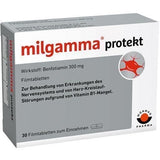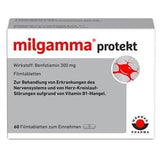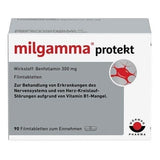Milgamma Protect 300 mg film-coated tablets is a vitamin-containing medicine. Benfotiamine is a lipid-soluble form of vitamin B1 (thiamine)
Milgamma PROTECT Indications:
Milgamma Protect 300 mg film-coated tablets is indicated for:
-treatment and prevention of clinical conditions of vitamin B1 deficiency (eg neuropathies and cardiovascular diseases), in cases where these conditions are not affected by diet;
-treatment of diabetic and alcoholic polyneuropathy.
Clinically diagnosed vitamin B1 deficiency may occur in cases of:
-improper or inadequate diet and nutrition;
-long-term parenteral nutrition (intravenous nutrition);
-postene;
-hemodialysis;
-malabsorption - a disorder in which food ingredients are not properly absorbed in the small intestine;
-chronic alcoholism;
-increased needs for vitamin B1 (eg during pregnancy and lactation).
Milgamma Protect 300 mg film-coated tablets are also used to treat neuropathies and cardiovascular disorders that result from vitamin B1 deficiency.
Before you
take Milgamma Protect 300 mg film- coated tablets: Do not take Milgamma Protect 300 mg film-coated tablets: if you are hypersensitive (allergic) to benfotiamine, thiamine or any of the other ingredients of Milgamma Protect 300 mg film-coated tablets.
Taking Milgamma Protect 300 mg film-coated tablets with other medicines
Please tell your doctor or pharmacist if you are taking or have recently taken any other medicines, including medicines obtained without a prescription.
Thiamine can be deactivated by 5-fluorouracil (an active substance used to treat cancer).
Taking Milgamma Protect 300 mg film-coated tablets with food and drink
No special precautions required.
Fertility, Pregnancy and lactation
Pregnancy
During pregnancy and lactation, the recommended daily dose of vitamin B1 is 1.4 - 1.6 mg. There are no safety data at doses higher than the recommended daily dose.
This dose may be increased during pregnancy, but only if you are deficient in vitamin B1.
Use Milgamma Protect 300 mg film-coated tablets only if your doctor considers it absolutely necessary.
Breast-feeding
During breast-feeding, the recommended daily dose for Vitamin B1 is 1.4 - 1.6 mg. The safety of doses higher than the recommended daily dose has not been established.
If you are breast-feeding, you should only use Milgamma Protect 300 mg film-coated tablets if you suffer from a confirmed vitamin B1 deficiency and if your doctor thinks that using Milgamma Protect 300 mg film-coated tablets is absolutely necessary.
Vitamin B1 passes into breast milk.
Fertility
There are no clinical data on the effect of Milgamma Protect 300 mg film-coated tablets on fertility.
If you are pregnant or breast-feeding, think you may be pregnant or are planning to have a baby, ask your doctor or pharmacist for advice before taking any medicine.
Driving and using machines
Milgamma Protect 300 mg film-coated tablets does not affect your ability to drive or use machines.
Milgamma PROTECT Dosage:
Adults
Unless otherwise prescribed, the usual dosage for the treatment of clinical conditions of vitamin B1 deficiency and the treatment of diabetic and alcoholic polyneuropathy is 1 film-coated tablet (300 mg Milgamma Protect) once daily.
The usual dose for the prevention of clinical conditions of vitamin B1 deficiency (eg neuropathies and cardiovascular disease), in case they cannot be improved by diet, is half a Milgamma Protect 300 mg film-coated tablet once daily.
Use in children and adolescents
Safety and efficacy in children and adolescents up to 18 years of age have not been established.
Milgamma PROTECT Adults:
A normal dosing regimen is recommended in elderly patients.
Patients with renal impairment
In these patients Milgamma Protect 300 mg film-coated tablets can be administered in a normal dose.
Patients with hepatic impairment
Safety and efficacy in patients with hepatic impairment have not been established.
Application method
The film-coated tablet should be swallowed with some liquid. The tablets can be taken at any time of the day. The tablets can be divided into two equal halves.
Method and route of administration
Take the entire film-coated tablet with a glass of water. The tablets can be taken at any time of the day. The tablet can be divided into two equal halves.
Duration of use The
duration of use of Milgamma Protect 300 mg film-coated tablets is determined by the success of the treatment.
Milgamma Protect 300 mg film-coated tablets are initially given for a period of at least 3 weeks in the case of vitamin B1 deficiency and for a period of at least 4 weeks in the case of diabetic and alcoholic polyneuropathy. The maintenance treatment is then determined by the therapeutic response with 150 mg or 300 mg Milgamma Protect film-coated tablets. In case of unsatisfactory therapeutic response or lack thereof after 3 weeks in cases of vitamin B1 deficiency or after 4 weeks in cases of diabetic and alcoholic polyneuropathy, treatment should be re-evaluated.
Talk to your doctor or pharmacist if you feel that the effect of Milgamma Protect 300 mg film-coated tablets is too strong or too weak.
Possible side effects
Like all medicines, Milgamma Protect 300 mg film-coated tablets can cause side effects, although not everybody gets them.
The following frequency is used to assess side effects:
- Very common: > 1/10;
- Common: > 1/100 to <1/10;
- Uncommon: > 1 / 1,000 to <1/100;
- Rare: > 1 / 10,000 to <1 / 1,000;
- Very rare: <1 / 10,000, including isolated cases;
- Not known: No estimate can be made from the available data.
Important side effects or symptoms that you should be aware of and take the necessary measures if you are affected:
If any of the following side effects occur in you, please stop using Milgamma Protect 300 mg film-coated tablets and consult a doctor immediately. .
Immune system disorders:
Very rare: Hypersensitivity reactions (allergies) such as skin rash, urticaria (hives).
Gastrointestinal disorders:
Very rare: Isolated cases of nausea and other gastrointestinal complaints have been documented in clinical trials with benfotiamine.
If any of the side effects gets serious, or if you notice any side effects not listed in this leaflet, please tell your doctor or pharmacist.
What Milgamma Protect 300 mg film-coated tablets contains
Active substance : benfotiamine.
Each film-coated tablet contains 300 mg of benfotiamine.
The other ingredients are:
Tablet core:
Microcrystalline cellulose, talc, povidone, anhydrous silica, croscarmellose sodium, longer chain individual glycerides.
Tablet coating:
Hypromellose, titanium dioxide, polyethylene glycol, saccharin sodium.






